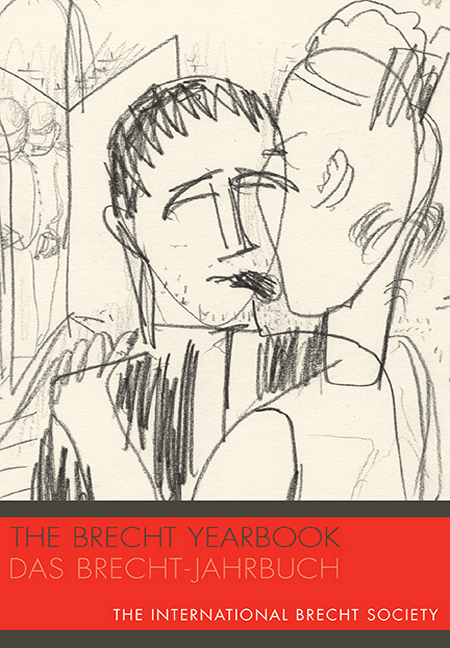Book contents
- Frontmatter
- Contents
- Editorial
- Tribute
- Documents from the Inaugural 24h DURCHEINANDER in Berlin
- Brecht-Images: Artist’s Introduction
- New Brecht Research
- The Temporality of Critique: Bertolt Brecht's Fragment Jae Fleischhacker in Chikago (1924–1929)
- Apparate und Körper: Überlegungen zu Bertolt Brechts Radiolehrstück Der Ozeanflug
- Wer ist Oscar? Ein unveröffentlichter Brief an Brecht vom 12. Juni 1918 aus schottischer Kriegsgefangenschaft
- “leg das buch nicht nieder, der du das liesest, mensch”: Brechts Gedicht “Die Nachtlager”
- Übersehen oder verbannt? Hanns Eislers Bilder aus der Kriegsfibel
- Special Insert: Accompaniments to Brecht, Music, and Culture
- Framing Two Accompaniments to Brecht, Music and Culture: Hanns Eisler in Conversation with Hans Bunge
- Introduction to Hanns Eisler Gespräche mit Hans Bunge: Fragen Sie mehr über Brecht
- Memories of Hans Bunge: on the occasion of his ninetieth birthday, 3 December 2009
- Das “Wiedersehen”: Der chinesische Dichter und Germanist Feng Zhi und Bertolt Brecht
- Brechtian Challenges to Theater Artists during the Internal War in Peru
- “Good Woman should have been done in one of our big theaters long before this”: Brecht, the Students, and the Making of the New Wave of Australian Theater
- Mark Twain's “Magnanimous-Incident” Hero and Bertolt Brecht's Der gute Mensch von Sezuan
- Navid Kermani's Literary Reflections: On Kafka, Brecht, and the Koran
- Karl Kraus und Bertolt Brecht: Über die Vergleichbarkeit des Unvergleichlichen
- Book Reviews
- Notes on the Contributors
Framing Two Accompaniments to Brecht, Music and Culture: Hanns Eisler in Conversation with Hans Bunge
from Special Insert: Accompaniments to Brecht, Music, and Culture
Published online by Cambridge University Press: 11 March 2017
- Frontmatter
- Contents
- Editorial
- Tribute
- Documents from the Inaugural 24h DURCHEINANDER in Berlin
- Brecht-Images: Artist’s Introduction
- New Brecht Research
- The Temporality of Critique: Bertolt Brecht's Fragment Jae Fleischhacker in Chikago (1924–1929)
- Apparate und Körper: Überlegungen zu Bertolt Brechts Radiolehrstück Der Ozeanflug
- Wer ist Oscar? Ein unveröffentlichter Brief an Brecht vom 12. Juni 1918 aus schottischer Kriegsgefangenschaft
- “leg das buch nicht nieder, der du das liesest, mensch”: Brechts Gedicht “Die Nachtlager”
- Übersehen oder verbannt? Hanns Eislers Bilder aus der Kriegsfibel
- Special Insert: Accompaniments to Brecht, Music, and Culture
- Framing Two Accompaniments to Brecht, Music and Culture: Hanns Eisler in Conversation with Hans Bunge
- Introduction to Hanns Eisler Gespräche mit Hans Bunge: Fragen Sie mehr über Brecht
- Memories of Hans Bunge: on the occasion of his ninetieth birthday, 3 December 2009
- Das “Wiedersehen”: Der chinesische Dichter und Germanist Feng Zhi und Bertolt Brecht
- Brechtian Challenges to Theater Artists during the Internal War in Peru
- “Good Woman should have been done in one of our big theaters long before this”: Brecht, the Students, and the Making of the New Wave of Australian Theater
- Mark Twain's “Magnanimous-Incident” Hero and Bertolt Brecht's Der gute Mensch von Sezuan
- Navid Kermani's Literary Reflections: On Kafka, Brecht, and the Koran
- Karl Kraus und Bertolt Brecht: Über die Vergleichbarkeit des Unvergleichlichen
- Book Reviews
- Notes on the Contributors
Summary
In 1954, while working as one of Bertolt Brecht's assistants at the Berliner Ensemble, Hans Bunge began recording Brecht in rehearsal. Thanks to these recordings, we have today a unique, firsthand source of information on the way in which Brecht worked. As well as recording rehearsals, Bunge also interviewed many of Brecht's friends and colleagues and asked them about their experiences of their artistic association with Brecht, the nature of their collaboration, and their thoughts about the Brechtian theater. Among those he interviewed was the composer Hanns Eisler, one of Brecht's professional collaborators and his closest friend.
The conversations, although part of the German edition of Eisler's complete works (published in the GDR in 1975 under the title Hanns Eisler Gespräche mit Hans Bunge: Fragen Sie mehr über Brecht), have never been fully translated into English. Fifty-three years after Eisler's death and fifty-nine after Brecht's, these fascinating conversations are now available to an English-speaking audience for the first time. Sabine Berendse (Hans Bunge's daughter) and Paul Clements translated and edited the German original. It was published in October 2014 by Bloomsbury under the title: Brecht, Music and Culture: Hanns Eisler in Conversation with Hans Bunge.
The two texts that follow connect with that volume but are not found in its pages. The first is one of the introductions for the 1975 edition, by the renowned Marxist musicologist, conductor, and pianist Georg Knepler. For reasons of space, the English translation of Knepler's text was not included in the Bloomsbury volume. I am pleased that it can appear here because it gives a detailed and informative overview of the Eisler-Bunge conversations and establishes the book's rightful place in history.
The second text, written by Manfred Bierwisch, the internationally acclaimed German linguist and Hans Bunge's close friend, was originally a memorial address on the occasion of Bunge's ninetieth birthday and the opening of his personal archive to the public at the Academy of Arts in Berlin. The article provides a sensitive and fascinating view of Bunge's remarkable life, a life, furthermore, that was formed through World War II, by his decision to settle in the socialist GDR and that was immensely influenced by Bertolt Brecht and his work.
- Type
- Chapter
- Information
- The Brecht Yearbook / Das Brecht-Jahrbuch 40 , pp. 125 - 128Publisher: Boydell & BrewerPrint publication year: 2016

